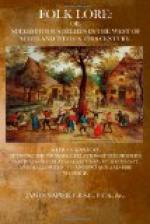There were various other methods for divining or consulting fate or deity. M’Tagart refers to a practice of divining by the staff. When a pilgrim at any time got bewildered, he would poise his staff perpendicularly, and there leave it to fall of itself; and in whatever direction it fell, that was the road he would take, believing himself supernaturally directed. Townsmen when they wished to go on a pleasure excursion to the country, and careless or unsettled which way to go, would apply to this form of lot. In the old song of “Jock Burnie” there occurs the following verse:—
“En’ on en’ he
poised his rung, then
Watch’d
the airt its head did fa’,
Whilk was east, he lapt and
sung then,
For there his
dear bade, Meg Macraw.”
This practice was common with boys in the country fifty years ago, both for determining where to go for pleasure, or if in a game one of their number had hidden, and could not be found, as a last resort the stick was poised, and in whatever direction the stick fell, search was renewed in that direction.
Such things as these seem trifling, and it would seem folly to treat them seriously; but they were not always trifling matters. Some of our Biblical scholars say that it was to this kind of divining that the prophet Hosea referred when he said, “Their staff declareth unto them,” and at the present day there are nations who practice such methods for determining important affairs of life.
The New Zealand sorcerers use sticks for divining, which they throw into the air, and come to their decisions by observing in which direction these sticks fall. Even in such matters as sickness or bodily injury, the direction in which the falling sticks lie, or it may be a certain stick in the group, directs the way to a physician. In ancient times the Magian form of divining was by staves or sticks. The diviner carried with him a bundle of willow wands, and when about to divine he untied the bundle and laid the wands upon the ground; then he gathered them and threw them from him, repeating certain words as if consulting some divinity. The wands were of different lengths, and their numbers varied from three to nine, but only the odd numbers 1, 3, 5, 7, 9 belonged to heaven, the even numbers 2, 4, 6, 8 belonged to earth. The Chinese divine after this fashion at the present day. From such ideas has doubtless arisen the saying that there is luck in odd numbers, a belief which, after a fashion, still prevails.
The virtue and mysterious power of the divining rod is still believed by many, and has frequently been resorted to during this century for the purpose of discovering water springs and metallic veins. The diviner takes a willow wand with a forked end: the forked points are held in his two hands, the other end pointing horizontally in front of him, and as he walks slowly over a field he watches the movements of the rod. When it bends towards the earth,




